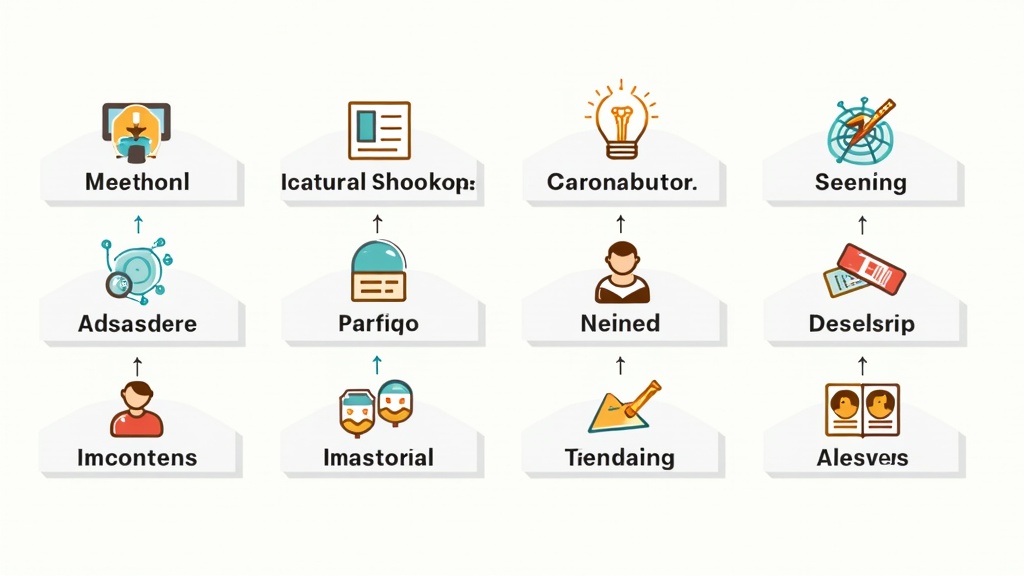Types of Qualitative Research Methods & Classification
Qualitative research includes phenomenology, ethnography, grounded theory, case studies, and more. Here's how to choose the right approach for your research questions.
14 min read
Agent Interviews
Updated: 2025-11-13
Qualitative research includes a diverse family of methodological approaches designed to explore, understand, and interpret human experiences, social phenomena, and complex organizational dynamics through rich, detailed investigation of meaning, context, and process.

These qualitative research methods prioritize depth over breadth, seeking to understand the "why" and "how" behind human behavior rather than simply measuring frequencies or correlations that characterize quantitative approaches.
The methodological diversity within qualitative research reflects its philosophical foundations in interpretivism, constructivism, and phenomenology, which recognize that reality is socially constructed and best understood through careful examination of lived experiences, cultural contexts, and interpretive processes. This diversity enables researchers to select methodological approaches that align with specific research questions, theoretical frameworks, and practical constraints while maintaining scientific rigor and analytical depth.
Contemporary qualitative research has evolved to incorporate digital technologies, mixed-method designs, and innovative analytical approaches that expand traditional boundaries while preserving the fundamental commitment to understanding human experience in its natural complexity. Modern qualitative researchers use video analysis, social media ethnography, virtual reality environments, and collaborative online platforms to access previously inaccessible research contexts and participant populations.
The importance of selecting appropriate qualitative methodologies can't be overstated, as different approaches yield different types of insights and require distinct analytical frameworks, data collection strategies, and interpretation approaches. Researchers must understand methodological distinctions to ensure research design aligns with inquiry objectives while maintaining theoretical consistency and methodological rigor throughout the investigation process.
When to Use Different Qualitative Approaches
Research objective alignment determines methodological selection based on whether investigations seek to explore lived experiences, understand cultural patterns, develop theoretical frameworks, or examine organizational processes. Different qualitative approaches excel in addressing specific types of research questions and theoretical orientations.
Methodological selection criteria include the nature of phenomena under investigation, available access to research contexts, participant characteristics, time constraints, and resources available for data collection and analysis. Complex phenomena requiring deep understanding benefit from intensive methodologies, while exploratory studies may employ more flexible approaches.
Context considerations affect methodology selection when research addresses sensitive topics, hard-to-reach populations, organizational settings, or cultural contexts that require specialized approaches to ensure ethical research conduct and meaningful data collection.
Theoretical framework compatibility ensures selected methodologies align with underlying philosophical assumptions and analytical approaches that guide inquiry design and interpretation processes. Methodological choices should reflect theoretical commitments while maintaining internal consistency throughout research design and implementation.
Practical constraints including time limitations, budget restrictions, access challenges, and researcher expertise influence methodology selection when ideal approaches may not be feasible within project parameters. Researchers must balance methodological ideals with practical realities while maintaining research quality and integrity.
Implementation Process and Extensive Type Classification
Effective qualitative research implementation requires systematic understanding of methodological options, their underlying assumptions, and appropriate application contexts to ensure research design supports inquiry objectives while maintaining methodological rigor and analytical depth.
Phenomenological Research Approaches
Phenomenological research focuses on understanding the essence of lived experiences as they appear to consciousness, seeking to identify fundamental structures of experience that transcend individual variations. This approach examines how individuals experience and make meaning of particular phenomena without imposing external theoretical frameworks or causal explanations.
Descriptive phenomenology, following Husserlian traditions, emphasizes careful description of experience as it presents itself to consciousness, requiring researchers to bracket their assumptions and preconceptions to understand phenomena from participants' perspectives. This approach proves valuable for understanding experiences that are difficult to access through other methodologies.
Interpretive phenomenology, influenced by Heideggerian philosophy, recognizes the interpretive nature of understanding and emphasizes the contextual, temporal, and relational aspects of human experience. This approach enables examination of how experiences are shaped by cultural, historical, and social contexts that influence meaning-making processes.
Hermeneutic phenomenology combines description with interpretation, recognizing that understanding always involves interpretation within particular contexts and relationships. This approach enables deeper exploration of meaning structures while acknowledging the researcher's role in interpretive processes.

Ethnographic and Cultural Studies
Ethnographic research involves prolonged engagement with cultural groups to understand social practices, belief systems, and cultural patterns through participant observation and immersive fieldwork. This methodology enables deep understanding of cultural contexts and social processes that shape human behavior and meaning-making.
Traditional ethnography employs extended fieldwork within specific cultural contexts, using participant observation, informal interviewing, and cultural immersion to understand how groups create and maintain shared meanings, practices, and social structures.
Organizational ethnography adapts ethnographic methods to workplace settings, examining organizational cultures, power dynamics, and informal practices that influence employee behavior and organizational effectiveness. This approach reveals hidden aspects of organizational life that affect performance and satisfaction.
Digital ethnography explores online communities, social media environments, and virtual spaces to understand how digital technologies shape social interactions, identity formation, and cultural practices in contemporary society.
Auto-ethnography combines ethnographic observation with personal narrative, using researcher experiences as data to explore cultural phenomena and social processes. This approach enables examination of sensitive topics and marginalized experiences while acknowledging researcher positionality.
Grounded Theory Methodology
Grounded theory methodology systematically generates theoretical explanations of social processes through iterative data collection and analysis that builds theoretical understanding from empirical observations. This approach enables development of new theories that explain social phenomena without imposing predetermined theoretical frameworks.
Classic grounded theory, developed by Glaser and Strauss, emphasizes systematic coding procedures, theoretical sampling, and constant comparative analysis to generate theories that are "grounded" in empirical data rather than existing theoretical frameworks.
Constructivist grounded theory recognizes the interpretive nature of research and emphasizes the co-construction of meaning between researchers and participants. This approach incorporates reflexivity and acknowledges multiple perspectives while maintaining systematic analytical procedures.
Dimensional analysis provides structured approaches to grounded theory that emphasize identifying central phenomena and examining conditions, contexts, and consequences that influence social processes and outcomes.
Situational analysis extends grounded theory through mapping techniques that visualize relationships, positions, and social worlds relevant to research phenomena, enabling examination of complexity and difference within social situations.
Case Study Research Designs
Case study research involves intensive investigation of specific instances, organizations, events, or phenomena to understand complex relationships and processes within real-world contexts. This approach enables detailed examination of how multiple factors interact within particular settings.
Single case studies provide in-depth examination of unique or exemplary cases that offer insights into broader phenomena or theoretical propositions. These studies prove valuable for understanding exceptional situations or testing theoretical frameworks.
Multiple case studies compare several cases to identify patterns, variations, and theoretical explanations that transcend individual contexts. This approach enables analytical generalization while maintaining contextual depth and complexity.
Instrumental case studies use specific cases to understand broader phenomena or theoretical issues rather than focusing on the case itself. This approach treats cases as vehicles for exploring wider research questions or theoretical propositions.
Intrinsic case studies examine cases for their own inherent interest rather than to illustrate broader phenomena. This approach provides detailed understanding of particular situations, organizations, or events that are important in their own right.
Narrative and Biographical Research
Narrative research examines stories and life histories to understand how individuals construct meaning, identity, and coherence through storytelling practices. This approach recognizes narrative as both a method of data collection and a fundamental human practice for organizing experience.
Life history research collects detailed accounts of individual experiences over time through in-depth interviews to understand personal development, social change, and the interaction between individual lives and broader social contexts. This approach provides insights into how social forces shape individual experiences.
Biographical research examines complete life stories to understand identity formation, decision-making processes, and the relationship between personal experiences and social structures. This methodology reveals how individuals navigate social expectations and constraints.
Auto-biographical research uses researcher narratives as primary data sources to explore personal experiences while connecting individual stories to broader social and cultural contexts. This approach enables examination of sensitive topics and marginalized experiences.
Oral history research preserves and analyzes personal accounts of historical events and social changes to understand how individuals experience and interpret significant social transformations. This methodology contributes to historical understanding while giving voice to marginalized perspectives.

Action Research and Participatory Methods
Action research combines investigation with intervention, seeking to understand social problems while simultaneously working to address them through collaborative engagement with research participants. This approach integrates knowledge generation with social action and empowerment.
Participatory action research involves community members as co-researchers who participate in all aspects of research design, implementation, and interpretation. This methodology democratizes research while ensuring investigations address participant-identified priorities and concerns.
Collaborative inquiry brings together researchers and practitioners to examine shared problems and develop practical solutions through systematic investigation and reflection. This approach bridges academic research and professional practice while generating actionable knowledge.
Community-based participatory research partners with community organizations to address local issues while building community capacity for ongoing research and advocacy. This methodology ensures research benefits participant communities while generating scholarly knowledge.
Appreciative inquiry focuses on identifying and building upon existing strengths and positive experiences rather than deficit-based problem identification. This approach enables organizational and community development through strength-based investigation and planning.
Selection Frameworks and Decision Tools
Methodological decision-making requires systematic evaluation of research questions, theoretical frameworks, practical constraints, and ethical considerations that influence approach selection. Decision frameworks help researchers navigate methodological options while maintaining consistency between research design elements.
Research question analysis examines whether inquiries seek to explore experiences, understand cultures, develop theories, examine cases, collect stories, or facilitate change. Different question types align with different methodological approaches and analytical frameworks.
Philosophical alignment ensures selected methodologies reflect researcher epistemological and ontological commitments while maintaining consistency between theoretical assumptions and methodological practices throughout investigation processes.
Practical feasibility assessment evaluates access requirements, time commitments, resource needs, and ethical considerations that affect methodology implementation. Researchers must balance methodological ideals with practical realities while maintaining research quality.
Best Practices for Methodological Excellence
Method selection criteria should systematically evaluate research objectives, theoretical frameworks, practical constraints, and ethical considerations to ensure methodological choices support inquiry goals while maintaining scientific rigor and ethical research conduct.
Quality standards in qualitative research emphasize credibility, transferability, dependability, and confirmability rather than traditional quantitative criteria, as established by Lincoln and Guba's foundational work. These standards require different evaluation approaches that recognize the interpretive nature of qualitative inquiry while maintaining systematic rigor.
Methodological rigor involves systematic data collection, transparent analytical procedures, reflexive practice, and appropriate validation strategies that ensure research quality while acknowledging the interpretive nature of qualitative investigation.
Hybrid approaches combine elements from different qualitative methodologies to address complex research questions that require multiple analytical perspectives. These approaches require careful integration to maintain methodological coherence while leveraging diverse analytical strengths.
Ethical considerations become particularly important in qualitative research given close relationships between researchers and participants, potential sensitivity of topics, and power dynamics that affect research relationships and outcomes.
Real-World Applications Across Research Domains
Academic Research Applications
Educational research employs various qualitative methodologies to understand learning processes, classroom dynamics, and educational experiences from student, teacher, and administrator perspectives. These investigations inform pedagogical practices and educational policy development.
Healthcare research uses qualitative approaches to examine patient experiences, provider perspectives, and organizational cultures that affect care quality and patient outcomes. These studies inform clinical practices and healthcare system improvements.
Social science research applies qualitative methodologies to understand social problems, cultural practices, and community dynamics that affect individual and collective well-being. These investigations contribute to theoretical development and social policy formation.
Business and Organizational Studies
Management research employs qualitative approaches to understand organizational cultures, leadership practices, and change processes that affect organizational effectiveness and employee satisfaction. These studies inform management practices and organizational development initiatives.
Marketing research uses qualitative methodologies to understand consumer experiences, brand perceptions, and purchase decision processes that inform product development and marketing strategy formation. These investigations provide insights that quantitative data cannot capture.
Innovation research applies qualitative approaches to understand creative processes, collaboration dynamics, and organizational factors that facilitate or inhibit innovation within different contexts and industries.
Healthcare and Social Service Research
Clinical research employs qualitative methodologies to understand treatment experiences, provider-patient relationships, and healthcare delivery processes that affect patient outcomes and satisfaction. These studies complement quantitative clinical research while providing patient perspective insights.
Social work research uses qualitative approaches to understand client experiences, service delivery processes, and community dynamics that affect intervention effectiveness and program outcomes. These investigations inform practice and policy development.
Public health research applies qualitative methodologies to understand health behaviors, community factors, and cultural practices that influence population health outcomes. These studies inform intervention design and health policy development.
Technical Considerations and Emerging Methodologies
Mixed qualitative approaches combine elements from different methodologies to address complex research questions that require multiple analytical perspectives. These approaches require careful integration to maintain methodological coherence while leveraging diverse analytical strengths.
Emerging methodologies incorporate digital technologies, virtual environments, and innovative analytical approaches that expand traditional qualitative research boundaries while maintaining fundamental commitments to understanding human experience and meaning-making processes.
Digital adaptations modify traditional qualitative methodologies for online environments, social media contexts, and virtual reality settings that provide access to new research contexts and participant populations while requiring new ethical and methodological considerations.
Technology integration enhances qualitative research through video analysis software, collaborative online platforms, and digital tools that facilitate data collection, analysis, and interpretation while maintaining methodological rigor and analytical depth.
Conclusion and Methodological Mastery
Methodological mastery requires deep understanding of different qualitative approaches, their philosophical foundations, and appropriate application contexts to ensure research design supports inquiry objectives while maintaining scientific rigor and ethical conduct throughout investigation processes.
Selection excellence involves systematic evaluation of methodological options against research objectives, theoretical frameworks, practical constraints, and ethical considerations to ensure optimal alignment between research design elements and inquiry goals.
Future trends in qualitative research point toward increased methodological innovation, technology integration, and interdisciplinary collaboration that expand research capabilities while maintaining fundamental commitments to understanding human experience in its natural complexity and social context.
The evolution of qualitative research continues toward more sophisticated, flexible, and responsive methodologies that address contemporary social challenges while preserving the analytical depth and interpretive richness that characterize excellent qualitative inquiry and meaningful knowledge generation.
